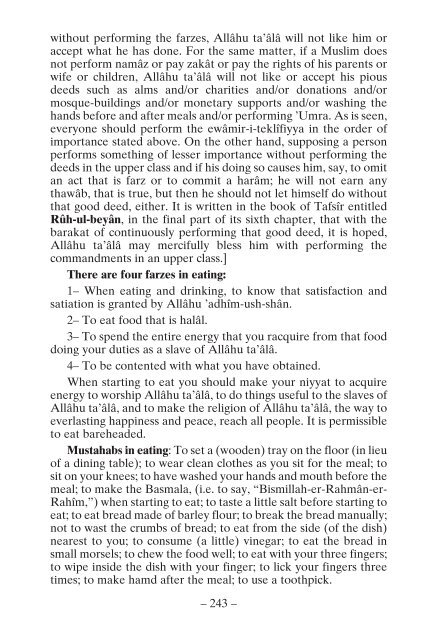Miftah-ul-Janna (Booklet for way to Paradise)
You also want an ePaper? Increase the reach of your titles
YUMPU automatically turns print PDFs into web optimized ePapers that Google loves.
without per<strong>for</strong>ming the farzes, Allâhu ta’âlâ will not like him or<br />
accept what he has done. For the same matter, if a Muslim does<br />
not per<strong>for</strong>m namâz or pay zakât or pay the rights of his parents or<br />
wife or children, Allâhu ta’âlâ will not like or accept his pious<br />
deeds such as alms and/or charities and/or donations and/or<br />
mosque-buildings and/or monetary supports and/or washing the<br />
hands be<strong>for</strong>e and after meals and/or per<strong>for</strong>ming ’Umra. As is seen,<br />
everyone sho<strong>ul</strong>d per<strong>for</strong>m the ewâmir-i-teklîfiyya in the order of<br />
importance stated above. On the other hand, supposing a person<br />
per<strong>for</strong>ms something of lesser importance without per<strong>for</strong>ming the<br />
deeds in the upper class and if his doing so causes him, say, <strong>to</strong> omit<br />
an act that is farz or <strong>to</strong> commit a harâm; he will not earn any<br />
thawâb, that is true, but then he sho<strong>ul</strong>d not let himself do without<br />
that good deed, either. It is written in the book of Tafsîr entitled<br />
Rûh-<strong>ul</strong>-beyân, in the final part of its sixth chapter, that with the<br />
barakat of continuously per<strong>for</strong>ming that good deed, it is hoped,<br />
Allâhu ta’âlâ may mercif<strong>ul</strong>ly bless him with per<strong>for</strong>ming the<br />
commandments in an upper class.]<br />
There are four farzes in eating:<br />
1– When eating and drinking, <strong>to</strong> know that satisfaction and<br />
satiation is granted by Allâhu ’adhîm-ush-shân.<br />
2– To eat food that is halâl.<br />
3– To spend the entire energy that you racquire from that food<br />
doing your duties as a slave of Allâhu ta’âlâ.<br />
4– To be contented with what you have obtained.<br />
When starting <strong>to</strong> eat you sho<strong>ul</strong>d make your niyyat <strong>to</strong> acquire<br />
energy <strong>to</strong> worship Allâhu ta’âlâ, <strong>to</strong> do things usef<strong>ul</strong> <strong>to</strong> the slaves of<br />
Allâhu ta’âlâ, and <strong>to</strong> make the religion of Allâhu ta’âlâ, the <strong>way</strong> <strong>to</strong><br />
everlasting happiness and peace, reach all people. It is permissible<br />
<strong>to</strong> eat bareheaded.<br />
Mustahabs in eating: To set a (wooden) tray on the floor (in lieu<br />
of a dining table); <strong>to</strong> wear clean clothes as you sit <strong>for</strong> the meal; <strong>to</strong><br />
sit on your knees; <strong>to</strong> have washed your hands and mouth be<strong>for</strong>e the<br />
meal; <strong>to</strong> make the Basmala, (i.e. <strong>to</strong> say, “Bismillah-er-Rahmân-er-<br />
Rahîm,”) when starting <strong>to</strong> eat; <strong>to</strong> taste a little salt be<strong>for</strong>e starting <strong>to</strong><br />
eat; <strong>to</strong> eat bread made of barley flour; <strong>to</strong> break the bread manually;<br />
not <strong>to</strong> wast the crumbs of bread; <strong>to</strong> eat from the side (of the dish)<br />
nearest <strong>to</strong> you; <strong>to</strong> consume (a little) vinegar; <strong>to</strong> eat the bread in<br />
small morsels; <strong>to</strong> chew the food well; <strong>to</strong> eat with your three fingers;<br />
<strong>to</strong> wipe inside the dish with your finger; <strong>to</strong> lick your fingers three<br />
times; <strong>to</strong> make hamd after the meal; <strong>to</strong> use a <strong>to</strong>othpick.<br />
– 243 –

















